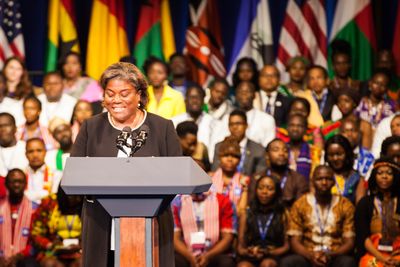How Joe Biden's pick for U.S. ambassador to the UN is a breath of fresh air
On Monday, President-elect Joe Biden said he would nominate Linda Thomas-Greenfield as Ambassador to the United Nations. Thomas-Greenfield served as the top U.S. diplomat overseeing the Bureau of African Affairs in the Obama Administration. Noted as a low-key, veteran foreign service officer across the U.S., Biden's pick is indicative of his goal to return traditional roles within his administration, while extending a sense of comradeship to diplomacy based corps.
The nomination of Thomas-Greenfield helps to elevate a Black woman and career service official to high profile positions. With Biden choosing Thomas-Greenfield, he is signaling to supporters his message of diversity and inclusion while elevating career diplomats not built on hypocrisy.
Thomas-Greenfield will bring a new tone, energy, and peace to the international collective of government, culture, and interpersonal communication. Something which the Trump Administration has either scoffed at, or completely disregarded.
Thomas-Greenfield's background further positions her as someone who can execute Biden's goal of returning the U.S. as a leading force among other great powerhouses of the world.
Thomas-Greenfield is a 35-year veteran of the State Department, serving as the U.S. ambassador to Liberia from 2008 to 2012 and has served in numerous other countries around the globe, including Kenya, Rwanda, and Pakistan, to name a few, before being forced out in the earlier months of the Trump administration.
"My mother taught me to lead with the power of kindness and compassion to make the world a better place," she said in a tweet on Monday about the nomination. "I've carried that lesson with me throughout my career in Foreign Service – and, if confirmed, I will do the same as Ambassador to the United Nations."
Moreover, Thomas-greenfield was born in Baker, Louisiana, in the early 1950s, attending segregated schools within her childhood. This reminds me a lot of my mother's childhood in South Carolina and the discrimination she received in school. However, for Black children like my mother, it was past the point of segregation.
In her 2019 Tedx Talk, Thomas-Greenfield described her and her mother's excitement for her to be going to school. The only problem was she lived in the Deep South "in which the KKK regularly would come on the weekends and burn a cross on someone's yard."
When she attended Louisiana State University, which was given a court order to allow Black students to attend, she understood she was entering a hostile environment. David Duke, the former Grand Wizard of the Klan, happened to be a student there, spewing anti-semitism.
As troubling as this is, she also had many harrowing experiences in the diplomatic corps.
When Thomas-Greenfield was dispatched to Rwanda in April 1994 amid the genocide to evaluate the refugee conditions, she explained she was confronted with a "glazed-eye young man" who mistook her for a Tutsi woman he was ordered to kill. Although she was afraid, she didn't panic, telling him her name, and asking for his, which allowed her to get out of a threatening situation.
Her use of conversation and inherent tenderness to talk to this young man as a human being and not an enemy really proves that you don't have to be contentious to convey a message no matter what the outcome will be.
This reaffirms that sheer positivity and care for other people is the answer.
Here is what others have said about her understanding of what it means to be a peacemaker, the UN, and human rights within the developing world.
Thomas-Greenfield understood that service values to all groups of people from all walks of life are not self-serving. Service is a selfless task of honor and dignity for the world at large. It's truly humbling to see all the Biden administration's endeavors to ensure a sense of humility amongst one another.
I'm genuinely ecstatic we are headed in the right direction, building inclusivity with the administration, finally.
